By Eric Vandenbroeck and co-workers
When The Palestinian Flag Was Raised At
Harvard
With more than 2,400 people on 46 campuses nationwide
since mid-April, AP reports that schools including Brown, Northwestern, and
Rutgers stand out for taking a different approach.
Agreements from such schools included commitments to
review their investments in Israel or hear calls to stop doing
business with the country. Many protester demands have focused on links to the
Israeli military.
Colleges and universities across the US will be
holding their graduation ceremonies today after a wave of pro-Palestinian
protests across the US. Several schools have enhanced security measures as
they prepare for
commencement ceremonies.
Protesters interrupted the University of
Michigan School of Music, Theatre & Dance commencement ceremony Friday, according to a video from a reporter with a CNN
affiliate.
The recent wave of pro-Palestinian protests on college
campuses came on suddenly and shocked people across the nation. But the
political tactics underlying some of the demonstrations were the result of
months of training, planning, and encouragement by longtime activists and
left-wing groups.
Activist Groups Trained Students For Months Before
Campus Protests
At Columbia
University, in the weeks and months before police took down encampments at the
New York City campus and removed demonstrators occupying an academic building,
student organizers began consulting with groups such as the National Students
for Justice in Palestine, veterans of campus protests, and former Black
Panthers.
They researched past
protests over Columbia’s expansion into Harlem, went to a community meeting on
gentrification and development, and studied parallels with the fight over land
between Palestinians and Israelis. They attended a “teach-in” put on by several
former Black Panthers, who told them about the importance of handling internal
disputes within their movement.
“We took notes from
our elders, engaged in dialogue with them, and analyzed how the university
responded to previous protests,” said Sueda Polat, a graduate student and
organizer in the pro-Palestinian encampment.
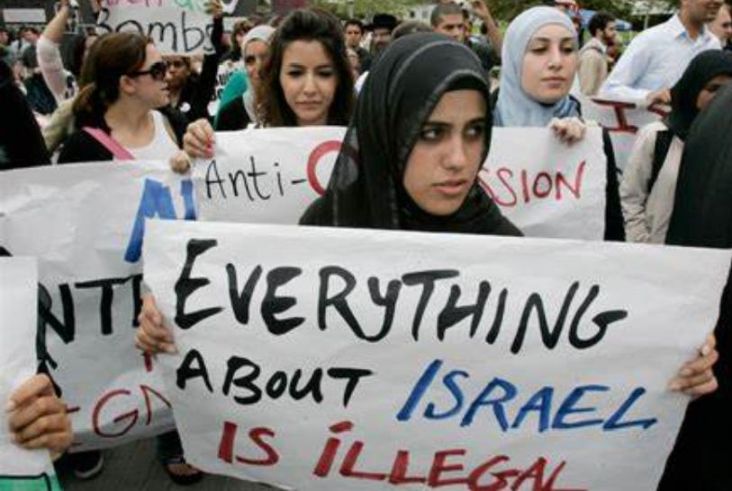
Underneath a row
of Palestinian flags is seen on the fence near a demonstration encampment at
Columbia University in New York:
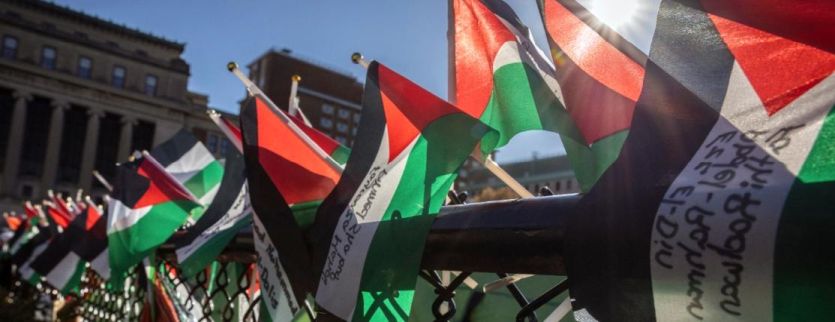
Though there isn’t a
centralized command overseeing the student movement opposing Israel’s invasion
of Gaza, there are connections between longstanding far-left groups and the
protesters.
The National Students for Justice in Palestine, or
NSJP, has been around for some two decades and has more than 300 chapters
across the U.S., many of which have helped organize college encampments and
building occupations.
NSJP has for months
called on students to stand strong against colleges until they divest
themselves of investments in entities doing business with Israel. Its social
media pages have become a scroll of encouragement to protesting students, with
videos showing activity at encampments and around the world. As early as
October, NSJP was promoting a “day of resistance” with demonstrations at
colleges.
Over time, the
messages from the national group became more pointed. “The Student Movement for
Palestinian Liberation will not be silenced; we will escalate until our demands
are met,” NSJP posted on social media on April 25.
‘No Divestment, No Commencement’
That same day on X,
the group posted drawings with “friendly advice” to protesting students. One
suggested they wear comfortable clothes and running shoes and bring water, an
energy bar and a bandanna in case of surveillance. Another referred to police as
“pigs” and offered this advice: “If someone is arrested, don’t linger too long
or pigs will kettle the march,” referring to a crowd-control tactic. “Free the
comrade, or else get their name and birthdate for jail support and keep it
moving.”
On April 29, the
group announced a new chant on social media: “No divestment, no commencement.”
University administrators have been concerned that coming graduations could be
interrupted by protesters.
NSJP didn’t respond
to emails seeking comment.
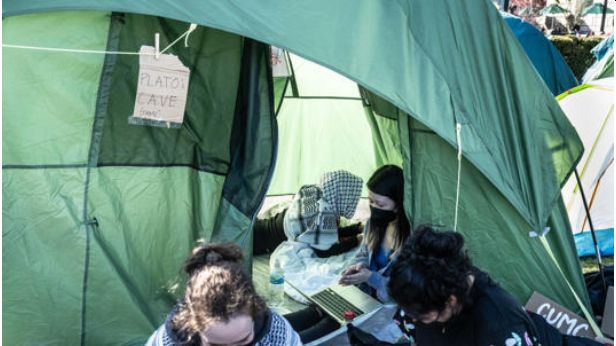
Some of the group’s campus
chapters have been suspended by universities, including at Columbia.
For the last decade,
donations to NSJP have been received and administered by the WESPAC
Foundation, according to Howard Horowitz, WESPAC’s board chairman. The
donations are passed on to NSJP “for projects in the United States,” he said,
declining to provide further details.
WESPAC, a nonprofit
based in Westchester County near New York City, is decades old, according to
its website. It has supported humanitarian causes, as well as organizations
that propagate antisemitism, according to the Anti-Defamation League. WESPAC
has posted support of pro-Palestinian protests on social media and posted
videos in which protesters held signs that refer to President Biden as
“Genocide Joe.”
Robert Herbst, a
representative for WESPAC, said “WESPAC has not coordinated, trained or
strategized with protest participants, nor do we support organizations that
have supported violence, antisemitism or terrorism.”
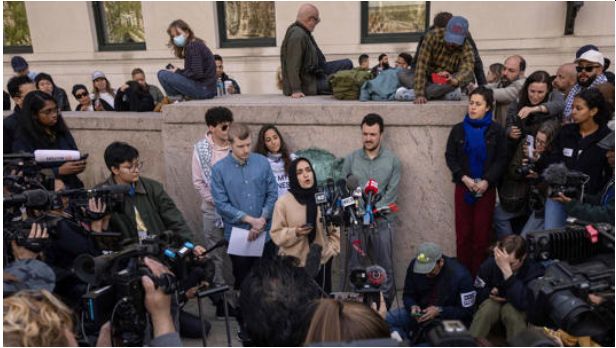
Resistance 101
In March, there was a
“Resistance 101” training scheduled at Columbia with guest speakers including
longtime activists with Samidoun: Palestinian
Prisoner Solidarity Network, a Vancouver, British Columbia-based group that
celebrated the Oct. 7 Hamas attack on Israel. The administration twice barred
the event, citing some of the organizers’ known support of terrorism and
promotion of violence. Columbia students hosted the event virtually
nonetheless, which prompted Columbia President Minouche
Shafik to suspend several of them.
During the session,
which lasted nearly two hours, Samidoun coordinator
Charlotte Kates encouraged students “to build an
internationally popular cradle of the resistance,” according to a recording
posted on YouTube.
“There is nothing
wrong with being a member of Hamas, being a leader of Hamas, being a fighter in
Hamas,” Kates said. “These are the people that are on
the front lines defending Palestine.”
Samidoun didn’t respond to emailed requests for comment. The
German government banned the group last November after saying it supported
terrorism and antisemitism and incited the use of violence to enforce political
interests.
Robert Pape, a
political scientist at the University of Chicago who studies political
violence, said outside organizers are only one factor in the protests. He said
they are successfully leveraging student anger over the violence in Gaza, which
many young people not conversant in the region’s complicated history are
watching on social media.
Anne-Marie Jardine, a
student arrested in a protest at the University of Texas at Austin, said images
from the war on social media helped motivate her involvement in the movement.
“It’s one thing to hear it on the news, but another to see children covered in
blood,” she said.
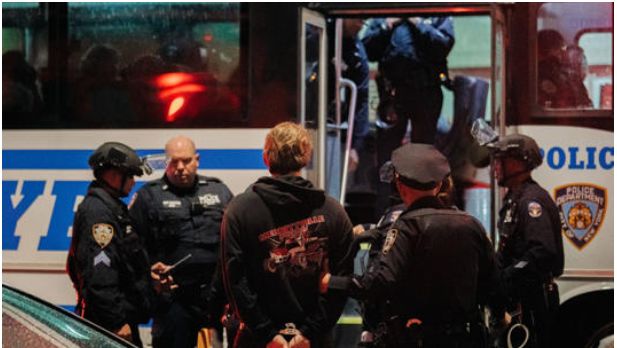
Pape said university
and national leaders should expect protests to continue through the summer and
fall. “You have a major dynamic happening in the world that is a major
concern,” Pape said.
Jacob Schmeltz, a
senior political science major at Columbia, went home to Montclair, N.J., for
Passover and said he felt so uncomfortable with the antisemitic rhetoric on
campus, he hasn’t come back.
“This should be the
time I should be able to enjoy my senior year,” he said. “But instead I have
felt so rejected by much of the Columbia community that have refused to call
out the incidents of antisemitism on campus.”
Protesters have
denied assertions of antisemitism, noting that many of those in the encampments
are Jewish themselves.
Discipline And Rigor
Polat said student
organizers at Columbia learned the discipline and planning needed to pull off
an effective protest movement not only from their work with veteran
demonstrators and outside groups, but from participating in Black Lives Matter
marches or student labor organizing.
Some tools they
learned were practical, such as how to raise money via student fundraisers and
donations from friends and supporters to buy tents for encampments.
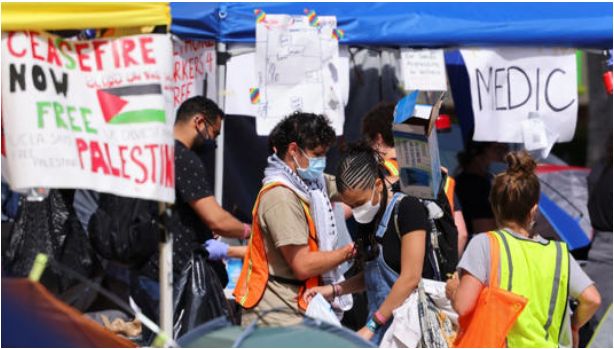
Saree Makdisi, a University of California, Los Angeles, English
professor and member of the school’s chapter of Faculty for Justice in
Palestine, said his school’s encampment had organized self-defense teams on the
front lines. Participants, who were confronted several times by pro-Israel
counter-protesters, had to undergo nonviolent de-escalation training. The
training was put on by students who themselves had received prior training in
nonviolent resistance. “There’s a whole set of discipline and procedures
that go into it,” he said.
UCLA’s encampment was
taken down following a confrontation with police Thursday morning.
Makdisi said that his generation of
pro-Palestinian student protesters in the U.S. during the 1980s weren’t
nearly as disciplined and organized as the students he encountered at the UCLA
encampment.
“We had a lot of
affect and feeling. But there’s a different kind of rigor to these students
that is striking,” he said.
For updates click hompage here